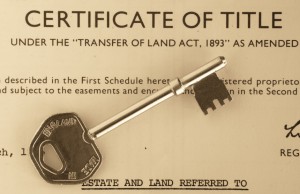 As a lawyer who engages in the general practice of law, I normally deal with a wide range of legal areas and issues. An area of the law which is a constant in my practice is real estate. People are continually buying, selling, or inheriting real estate and then having to make decisions relating to that real estate. What I want to focus on in this article are some general real estate issues which come up on a regular basis and might be helpful to you.
As a lawyer who engages in the general practice of law, I normally deal with a wide range of legal areas and issues. An area of the law which is a constant in my practice is real estate. People are continually buying, selling, or inheriting real estate and then having to make decisions relating to that real estate. What I want to focus on in this article are some general real estate issues which come up on a regular basis and might be helpful to you.
One question that comes up on a regular basis is how should I take title to a particular piece of property? This typically arises when you have more than one person who is going to have an ownership interest in the property. Holding property by joint tenancy is one type of concurrent ownership. A joint tenancy exists where a single estate and land is owned by two or more persons with a right of survivorship. If Abe and Mary take title to a property as joint tenants and Abe passes away, then Mary becomes the sole owner of the real estate.
Another type of concurrent ownership is called tenancy in common. This is a type of ownership whereby each co-tenant has a distinct proportionate undivided interest in the property, but the right to possession is common to all co-tenants. In a tenancy in common situation, the interest of an owner can be bequeathed to heirs or beneficiaries.
Another type of ownership interest is tenancy by the entirety. This type of ownership exists only between a husband and wife. There is right of survivorship under a tenancy by the entirety. A husband and wife may hold a property as joint tenants or tenants in common, but the presumption is that husband and wife will hold property as tenants by the entirety.
Another common question I receive is can I sell my real estate pursuant to a contract? The answer to this question is yes. A buyer and a seller can enter into a real estate contract whereby title to the property remains with the seller until completion of the contract. The buyer only has a contractual interest in the real estate until the terms of the contract are completed. The terms of a contract are negotiable between the buyer and seller. There are certain tax advantages to a seller in selling real estate under a contract, but there are also risks involved in this type of arrangement. If a default occurs under the contract, the Seller may have to go through the foreclosure process on the real estate much like a bank holding a mortgage forecloses on a piece of property.
Can I get title and possession to a piece of real estate which I never purchased? There is a concept under the law known as adverse possession. If an adverse party possesses an owner’s land without that owner’s permission, that owner may bring what’s known as an ejectment action to recover possession of the property as well as any damages. If the owner fails to take any action against the adverse party within a certain period of time, the owner potentially loses his cause of action and the adverse party can be vested with title. In order for adverse possession to ripen into title for an adverse possessor, the possession must be actual, visible, open and notorious, exclusive, hostile and continuous for ten years.
Can I transfer my property but still retain possession or some type of interest in the property? There is a concept under the law known as a life estate. A life estate is an ownership interest in property in which the duration of the interest is measured by the life or lives of one or more persons. It is possible to convey an irrevocable future and remainder interest to third parties, but retain a life estate in the property for the period of your lifetime. There is also available a tool known as a transfer on death deed whereby you can transfer a future interest in ownership of real estate to a third party upon your death. This type of deed is revocable.
What exactly is an easement? An easement is an interest in land which allows one party a limited right of use over the property of another. As an example, you can grant to a third party an easement which will allow that third party to cross your land for limited purposes of ingress and egress. You still own the property, but that third party has a legally recognizable interest in the use of the easement across your property.
Real estate disputes and issues concerning ownership interests are as old as the earth itself. I hope this article has given you some insight into the area of real estate law.
This article is published for information purposes only. It is not intended nor is it to be used as a substitute for independent legal advice.
Stu Weliever practices law with HENTHORN, HARRIS & WELIEVER, P.C., 122 E Main St, Crawfordsville, Indiana, and can be reached at (765) 362-4440 or at stuw@henthornlaw.com.

